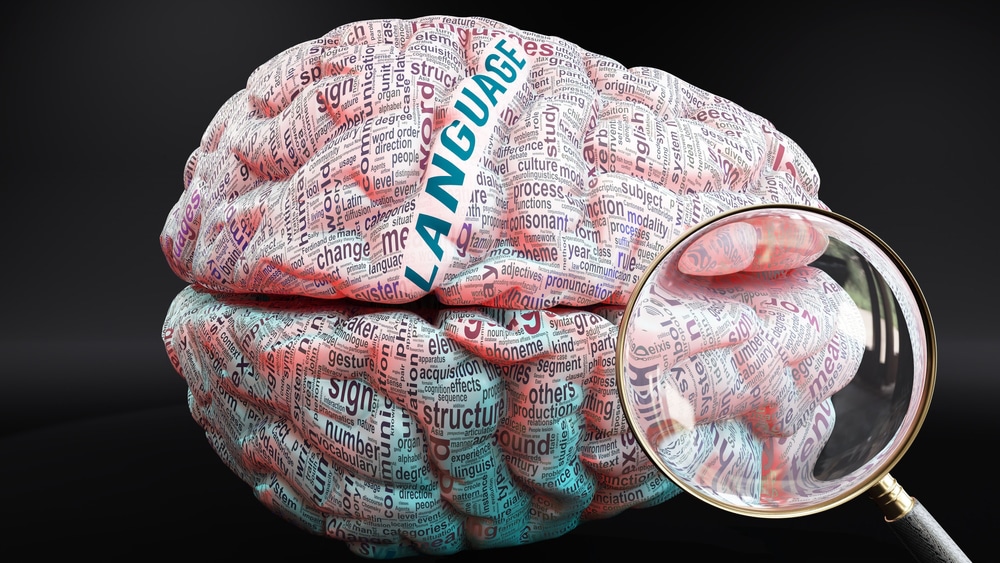Isn’t it true that learning a new language is difficult? It certainly takes hundreds of hours of practice! It seems like some people pick up a new language ‘quickly’, while others struggle to learn even simple phrases. (Check out our blog on ‘It’s not you, it’s the method!’) Whether you feel confident about your language skills, or you’ve almost given up on improving your English or Spanish, it’s helpful to know what’s happening in all of our brains while we process new languages as an adult.
But really, have you ever wondered what happens in your brain when you’re learning a new language? It’s actually really crazy, and very interesting. Over the past two decades, neuroscientists have discovered that multilingualism has positive repercussions on one’s motor and cognitive abilities and that these benefits might carry over into old age. Functional magnetic resonance imaging, or fMRI, is a type of brain imaging method that allows researchers to investigate one particularly fascinating component of this process: what occurs in our brains when we acquire a new language. Let’s get started.
1. Your Brain Changes
Depending on what we do in our life (work, activities, etc), our brain has the extraordinary power to alter depending on that action. Several studies have indicated that, while we can’t see it with our eyes, if we were to put the brains of a musician and an athlete on an fMRI, we might discover that they have changed shape to suit their specific needs.
Thanks to the ability to process information and change the way it functions, some blind people develop the ability to echolocate. Echolocation makes sight-impaired people able to position themselves in certain spaces and environments based on echoes, just like bats! And, as if that weren’t astounding enough, all human beings can make these changes (evolution!) without even realizing it.
Everything we learn shapes our brain, and learning a new language does it too.
2. Your Brain Builds Special Connections
Several studies have looked into how the brain learns languages. This depends on whether the language is our native language or a foreign language.
Neuroscientists, for example, explored the many similarities between the English and Spanish languages in an interesting experiment. In this study, native English speakers were asked to learn some basic rules for conjugating verbs in Spanish while using fMRI data to observe their brain process.
Certain areas of the people’s brains would consistently activate while listening to sentences containing words they hadn’t yet learned, rather than using areas responsible for known vocabulary. This imaging revealed that brain activity increased significantly only when new vocabulary was assimilated into existing knowledge.
3. Brain Activity Increase Significantly when Learning a Language
What does this mean? Brain science is revealing that learning a new language involves a rewiring process in which existing neural networks are changed, restructured, and activated to accommodate new information. When we learn a new word or expression, for example, our brain encodes it by “connecting” it to other similar pieces of information already stored away in memory. In these cases, words from two languages can be confused since both occupy the same neurons in different parts of the brain.
This explains why bilingual people frequently switch languages while speaking fast or when tired: they don’t always have time to switch languages before thinking about what they want to say! But wait, there’s more! Imagine having to go through the entire process of searching through all of your information stored every time; I’d be tired too.
4. The areas in your brain that process language also change
The same brain circuits that process our first language are used when learning a new language, but when people who speak more than one language switch languages, different areas of the brain are activated depending on where they were learned in the world. During speech tasks involving both languages, people who grew up bilingual showed activity in certain parts of the brain. On the other hand, people who learned languages later in life showed activity in completely different areas.
We can understand and produce words and sentences no matter when we learned them thanks to the arcuate fasciculus – or a bundle of nerve fibers that connect the information according to the location. This means that the brain has the ability to create new information whenever is needed. For example, if you’re in a new place and can’t communicate at all, your brain will alter so that it can solve the problem and you can do it efficiently according to what is the context and the need at that moment. Isn’t that fantastic?
5. Our brains learn based on when you are learning
The study of the bilingual brain and how languages are handled and processed in our insides has shown that learning a new language is like driving a car: we simply need to change gears depending on whether we’re speaking French or German, Spanish or English.
Some research shows that when people learn English as adults, they activate different regions of their brains than those used by children who grow up with English as their mother tongue. This is because the way they learn it is completely different.
In fact, adults seem to learn English, using parts of the brain’s left hemisphere instead of the right area observed in young students. This means that even though children and adults may acquire a second language in similar ways, there are a lot of differences between them depending on when they learn it, as well as where.
Learn a new language now!
As previously said, brain science demonstrates that learning a new language engages our brain in a variety of processes that are just as crucial to our health as traditional exercises. Learning a new language is also an amazing way to keep your brain healthy and functioning in a very fulfilling and enriching way.
Don’t forget that apart from the cognitive benefits that learning a new language has, there are plenty more good things that we obtain from this activity – like being more employable, having a better understanding of the world we live in, learning a lot about new cultures and even becoming a better person! — Yes! Learning a language makes you a better person!
With all this being said, the bottom line is that learning Spanish, English or another language, is worth the effort. It’s possible for everyone to become fluent in another language if you have about 2 hours a week to work with an online language tutor. So, if you want to have a healthy brain, what are you waiting for? Learn a new language now! Call 469-338-9382 to discuss a trial class for $35 with a professional online tutor.





